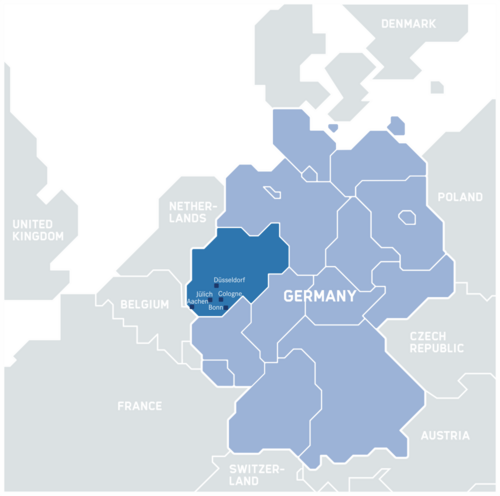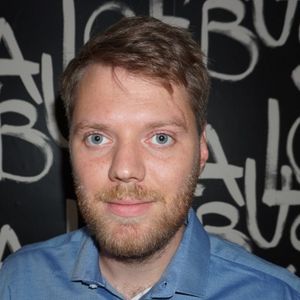Advance your own research with data science, learn from leading data scientists and exchange ideas across disciplines - this is possible at the Helmholtz School for Data Science in Life, Earth and Energy (HDS-LEE) in the North Rhine-Westphalian ABCD triangle (Aachen-Bonn-Cologne-Düsseldorf).
HDS-LEE in the Rhineland
HDS-LEE is an international, English-speaking graduate school in the ABCD (Aachen-Bonn/Cologne-Düsseldorf) triangle of North-Rhine-Westphalia as a cooperation between
- RWTH Aachen University and
- its University Hospital,
- the University of Cologne,
- the German Aerospace Center (DLR),
- the Max-Planck-Institut für Eisenforschung
- and Forschungszentrum Jülich.
HDS-LEE is part of JARA Center for Simulation and Data Sciences (JARA-CSD), which is the German competence center for computing and data infrastructures, user support, and methodological and disciplinary research in simulation, data analysis, and high-performance computing technologies. JARA is a unique cooperation between Helmholtz Research Center Jülich and RWTH Aachen University with strong international visibility. More specifically, the School for Simulation and Data Sciences (SSD) within JARA-CSD has the training of doctoral researchers as its focus and brings together leading researchers from university and research centers and fosters interdisciplinary supervision of the graduate students. Furthermore, HDS-LEE students will benefit from the international recognized regional graduate schools IRTG-2379 - Hierarchical and Hybrid Approaches in Modern Inverse Problems and AICES, which were fused under the roof of JARA-CSD. As part of the Helmholtz Information & Data Science Academy (HIDA), attractive events and courses are opened to doctoral researcher as well as student exchanges and symposia are facilitated between the other HIDA graduate schools.

More about the research at HDS-LEE
Reports on HDS-LEE
You can find out more about research at HDS-LEE and its doctoral students on the following pages:
HDS-LEE alumnus Leonardo Rydin Gorjão has been researching how we can ensure a constant power supply if we only get it from renewable energy sources - using data science methods. HIDA's exchange programs have enabled him to spend time at various Helmholtz centers and to network closely within the community.
Laura Helleckes gives insights of her project and being scientist in HDS-LEE. How does she benefit from the diversity of the disciplines in HDS-LEE?
Scientists at HDS-LEE have recently acquired three new large-scale AI projects. This means: new PhD researchers at the School, an even stronger network of partner institutions and, of course, many cutting-edge data science subjects to work on.
English is becoming the de-facto standard for an educated life. As a non-native speaker, you may support this development. But will new technology stop the rise of English? Read more about Danimir Doncevic's thoughts on this topic in his blog post.
What hurricanes and nasal breathing have in common
Mario Rüttgers uses Data Science methods to reveal the small hurricanes that occur in the nose when we inhale. He wants to help make future nose surgery more successful - and thus make it easier for patients to breathe.
Christian Gerloff completed his degree in electrical engineering. Now, he’s tracking down signals from one of the most mysterious and complex systems in existence. As a doctoral candidate at the HDS-LEE graduate school, Gerloff conducts research that unravels more hidden secrets of the human brain—thanks to data science methods.
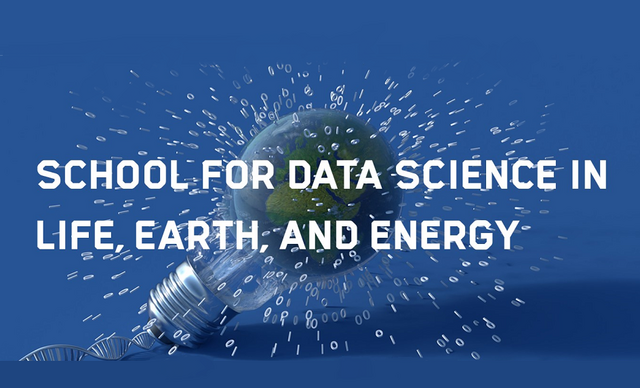
Our Mission
HDS-LEE aims to educate and train the next generation of data scientists in close contact to domain-specific knowledge and research in three application domains:
- Life and medical science: Systems medicine, Neuroscience, Computational biomedicine, Systems biotechnology, Bioinformatics
- Earth science: Terrestrial systems, Geofluiddynamics, Atmospheric composition
- Energy systems and material science: Design and operation of energy and chemical systems, Systems analysis and technology evaluation, Quantum theory of materials, Microstructure physics and alloy design
We are looking for excellent graduates in mathematics, computer science, physics, material science, earth science, life science and engineering from all over the world who are eager to work at the interface between domain-related research and data science. The doctoral researchers at HDS-LEE want to advance the development of Data Science methods as well as use state-of-the-art technologies of artificial intelligence and machine learning to solve challenging scientific problems.
HDS-LEE makes it possible to exchange ideas and information beyond our respective research fields. This gives us an insight into the other faculties and can also inspire a better understanding of the problems in our own areas.
Christian Gerloff
is researching the signals of the human brain at HDS-LEE - with data science. Read more about his project.
Scientific Curriculum
In the HDS-LEE, doctoral researchers are trained in all essential elements of information and data science, as well as in communication and other key qualifications. The training components of the program are strengthened by individually tailored training measures. An integral part of HDS-LEE is the curriculum of joint activities that comprises of:
- Lectures on Data Science, Methods and Applications
- Courses for scientific education, including training days at the Jülich Supercomputing Center (JSC) on topics such as parallel computing, machine learning and visualization
- Transferable skill courses: Scientific Writing, Academic Presentation, Good Scientific Practice and Management of a Doctoral Project
- Annual retreat
- Participation in (international) conferences
- Personal competence training and comprehensive support measures for networking and career development
HDS-LEE doctoral researchers are closely supervised by their thesis advisory committee. Such a committee is comprised of the two PIs who have initiated the doctoral project and a scientific co-advisor. Doctoral researchers will be hosted by the institutes of their PIs to enhance communication and exchange with the respective research groups.
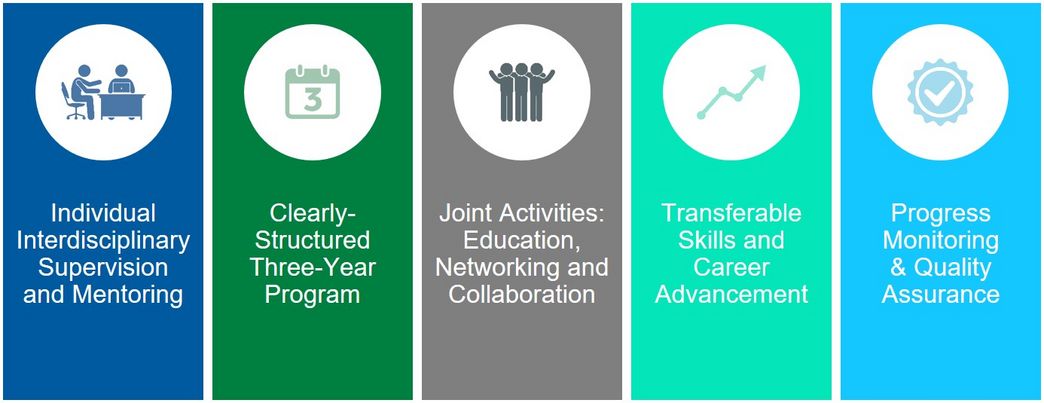
Funding and Duration of the Program
The doctoral researcher position is for a fixed term of 4 years. Salary of pay group 13 and social benefits are based on the provisions of the Collective Agreement for the Public Service (TVöD /TV-L).
Application and Further Information
A total of 22 doctoral positions are available, which are directly financed by HDS-LEE. In addition, interested Data Science doctoral researches can join the program as associated doctoral researchers, preferably from the HDS-LEE locations Aachen, Cologne, Düsseldorf and Jülich. The program starts every three years, the next call phase starts in 2025. The program language is English.
Applicants must have adequate knowledge of computer science in general, as HDS-LEE does not offer training in computer science basics such as programming. English language skills are also required.
Are you interested in becoming part of the HDS-LEE? Take a look at our guide for admission and our open positions.
"At HDS-LEE, I benefit most from the training offered: the soft skills courses and, of course, the networking opportunities. The exchange with other people who have similar problems or challenges in their research is very valuable."
Mario Rüttgers, associated doctoral researcher at HDS-LEE
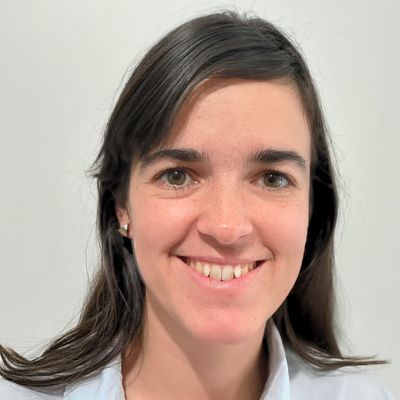
Dr. Anne Bulling
Scientific Coordinator HDS-LEE
Dr. Anne Bulling


Dr. Sarah Mertens
Scientific Coordinator HDS-LEE
Dr. Sarah Mertens



